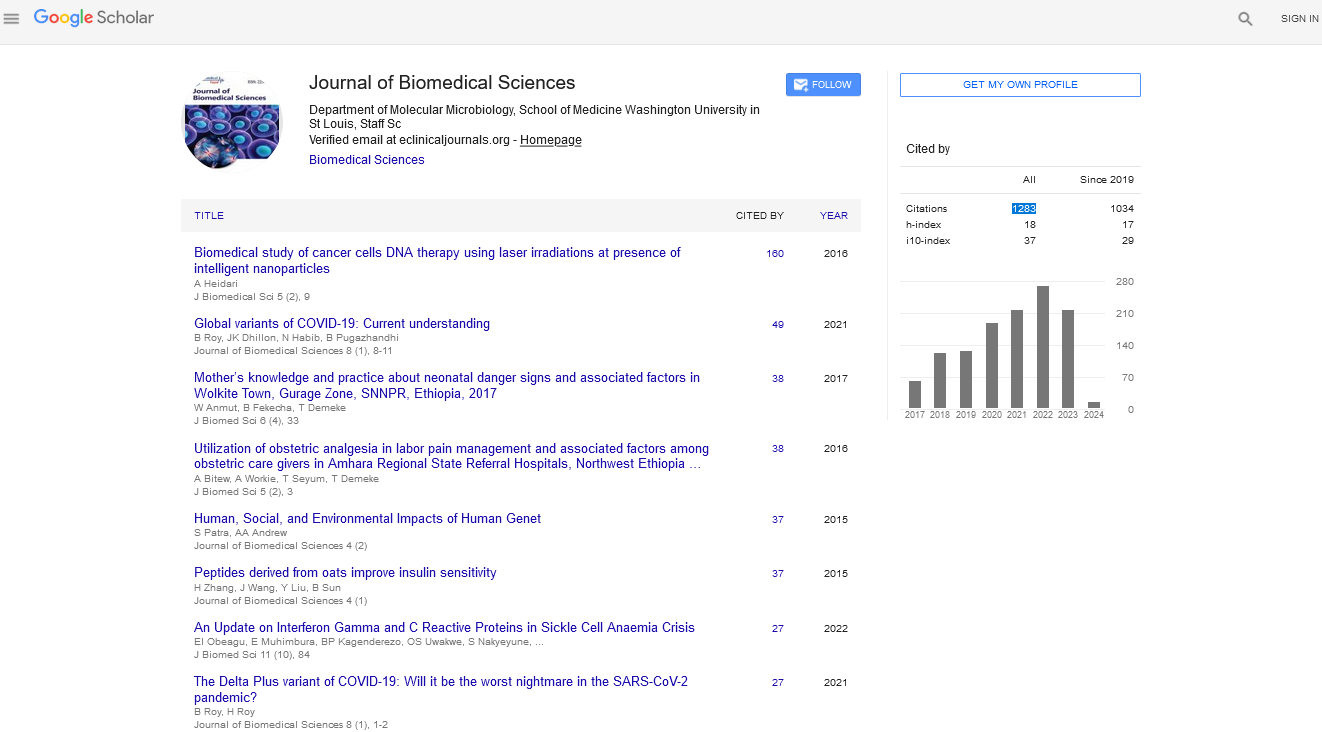Keywords
Physiological; Biomedical; Pathophysiology; Nano- biotechnology
Description
It is upheld by relevant essential sciences including life
frameworks and physiology, cell science, normal science,
microbiology, genetic characteristics and sub-nuclear science,
immunology, math and bits of knowledge, and bioinformatics.
As such the biomedical sciences have significantly more broad
extent of academic and investigation practices and monetary
significance than that portrayed by clinical facility research focus
sciences. Biomedical Sciences are the huge point of convergence
of bioscience assessment and financing in the 21st century.
Jobs inside biomedical science: A sub-set of biomedical
sciences is the investigation of clinical examination community
finding. This is ordinarily implied in the UK as 'biomedical
science' or 'clinical consideration science' There are somewhere
near 45 interesting specialisms inside clinical consideration
science, which are by and large assembled into three key
divisions
• Specialisms including life sciences
• Specialisms including physiological science
• Specialisms including clinical physical science or
bioengineering
Biomedicine (also implied as Western drug, standard
prescription or standard medication) is a piece of clinical science
that applies natural and physiological norms to clinical practice.
Biomedicine stresses standardized, evidence based therapy
endorsed through natural investigation, with therapy
constrained through authoritatively pre-arranged subject matter
experts, clinical chaperons, and other such approved specialists.
Biomedicine also can relate to various classes in prosperity
and regular related fields. It has been the prevalent game plan of
medicine in the Western world for over a century.
It consolidates various biomedical teaches and spaces of
specialty that regularly contain the "bio-"prefix like sub-nuclear
science, natural science, biotechnology, cell science,
embryology, nanobiotechnology, normal planning, research
office clinical science, cytogenetics, innate characteristics,
quality therapy, bioinformatics, biostatistics, systems science,
neuroscience, microbiology, virology, immunology, parasitology,
physiology, pathology, life designs, toxicology, and various others
that generally concern life sciences as applied to prescription.
Biomedicine is the establishment of current clinical benefits
and lab diagnostics. It concerns a wide extent of coherent and
creative approaches: from in vitro diagnostics to in vitro
preparation, from the nuclear instruments of cystic fibrosis to
the general population components of the HIV disease, from the
appreciation of sub-nuclear relationship to the examination of
carcinogenesis, from a Solitary Nucleotide polymorphism (SNP)
to quality treatment.
Biomedicine relies upon sub-nuclear science and joins all
issues of framing sub-nuclear medication into gigantic extension
basic and common sense associations of the human genome,
transcriptome, proteome, physiome and metabolite with the
particular viewpoint of preparing new advances for assumption,
investigation and treatment.
Biomedicine incorporates the examination of (patho)
physiological cycles with methods from science and physiology.
Approaches range from understanding sub-nuclear coordinated
efforts to the examination of the outcomes at the in vivo level.
These cycles are concentrated with the particular viewpoint of
devising new procedures for investigation and treatment.
Dependent upon the earnestness of the ailment, biomedicine
pinpoints an issue inside a patient and fixes the issue through
clinical mediation. Drug bases on calming afflictions instead of
additional fostering one's wellbeing.
In human sciences biomedicine is depicted genuinely in a
surprising manner. Through an anthropological point of
convergence biomedicine connects past the space of science
and legitimate real factors; it is a socio-social system which
everything considered addresses reality. While biomedicine is
for the most part thought to have no inclination on account of
the evidence based practices, Gaines and Davis-Floyd (2004)
highlight that biomedicine itself has a social reason and this is
because biomedicine reflects the principles and potential gains
of its producers.
39005





